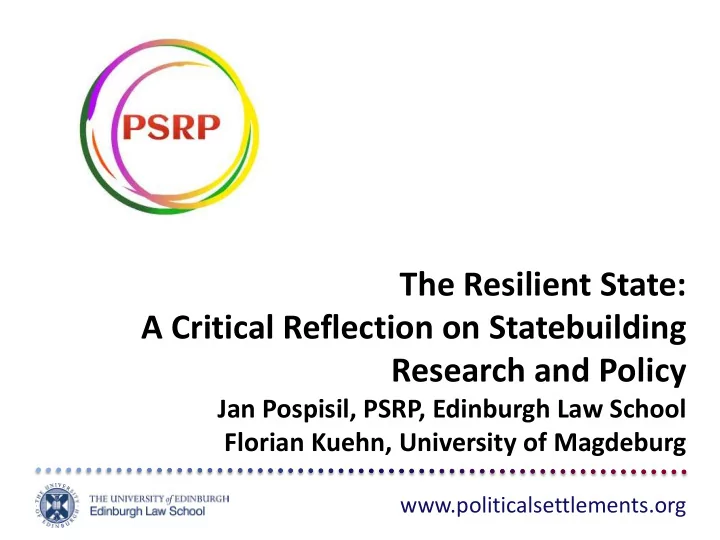

The Resilient State: A Critical Reflection on Statebuilding Research and Policy Jan Pospisil, PSRP, Edinburgh Law School Florian Kuehn, University of Magdeburg www.politicalsettlements.org
Research Problem ‘Resilience’ in statebuilding: Where does it come from, and why? How does it link up with other concepts? What does it tell us about international thinking on statebuilding and fragility? Paper in Third World Quarterly (forthcoming, doi 10.1080/01436597.2015. 108663) www.politicalsettlements.org
Resilience in Statebuilding Resilience in SB evolves around 2008 as counterpart to fragility • Deriving from ‘complex (eco-)social systems’ research, resilience • is transformed into a positive vision for change ERD 2009: resilience is suggested as ‘European approach’ to • overcome fragility in Africa; OECD 2008-2011: resilience as the ‘positive vision’ opposing fragility Parallel development in Humanitarian Aid and infrastructure • development, here with stronger applicability ‘Action Plan for Resilience in Crisis Prone Countries’: • presented by the European Commission on 19th June 2013 www.politicalsettlements.org
A Tectonic Shift? FSPs 2007: ‘ Align with local priorities’ – ideally • alignment with ‘government-led strategies’ OECD 2011: ‘… resilient states … are capable of • absorbing shocks and transforming and channelling radical change or challenges while maintaining political stability and preventing violence .’ EC Staff Document 2015: ‘Promoting resilience in • situations of conflict and fragility means factoring in the state’s incapacity or unwillingness to deal with its basic functions.’ www.politicalsettlements.org
‘Era of Disillusionment’ Emergence of resilience contrasts liberal approaches • in state- and peacebuilding and proclaims to address its shortcomings Product of an ‘ era of disillusionment ’ (Bell) in the • spheres of conflict transformation and democracy promotion Vague concept that helps translating the ‘local turn’ • (Mac Ginty/Richmond) to the policy level www.politicalsettlements.org
Four Generations of Statebuilding 1st generation: 2nd generation: 3rd generation: 4th generation: Conflict Resolution Failed States Fragile States Fragility/Resilience Violent conflict Types of state Types of state Diverse situations of Approach causes state failure failure fragility fragility Multilinear causes Root causes of Unilinear (governance, conflict / trigger explanations Complexity / Causes institutional factors cause conflict (institutional Hybridity capacity, to turn violent failure) participation…) Strengthening Stabilisation Institution Statebuilding on resilience of state- Main Lines of operations / conflict building, capacity various levels society relations, Intervention prevention & building (state, civil (channelling etc.). resilience / inclusivity transformation society) of political settlement DAC Policy Guidance DAC Guidelines Aktionsplan Zivile Fragile States Supporting Exemplary Conflict, Peace, Krisenprävention Strategy (USAID, Statebuilding in Document Development (1997) (Germany, 2004) 2005) Situations of Conflict and Fragility (2011) www.politicalsettlements.org
Resilience and the Politics of Statebuilding Institutionalist ‘liberal’ approaches – still popular • in policy, debunked in research Post-normative approaches : resilience, along • with others political settlements, hybrid political orders (also post-interventionist, Chandler) Reincarnation of normative conceptions : • Inclusive Political Settlements, resilience in g7+ ‘fragility spectrum’ www.politicalsettlements.org
Post-normative Statebuilding? Normative vs. post-normative concepts (inclusive • political settlements, g7+ vs. OECD/EC resilience) Outcomes and consequences are undecided, • general insights from policy research would suggest a merger Resilience provides for return of sovereignty • ‘neo-sovereignty’ as a product of failed • governmentality in post-colonial statehood www.politicalsettlements.org
Resilience as Neo-Sovereignty? Definition of g7+: • ‘Resilience refers to the ability of social institutions to absorb and adapt to the internal and external shocks and setbacks they are likely to face. Fragility thus implies that the consolidation of nationhood , and the safety, security and well being of the citizens are at risk of a relapse into crisis or violent conflict. This risk is gradually reduced as the institutions develop the necessary ability to cope with the type of threats they are exposed to.’ Normative challenge turns ‘resilience’ to an empty signifier: • post-normative space enables neo-sovereignty www.politicalsettlements.org
Conclusions Interesting times in statebuilding – formal • institutionalist approach (‘liberal statebuilding’) is in downswing (if not gone) Resilience represents international shift to post- • normative pragmatism Re-emergence of normative approaches: inclusiveness • and legitimacy in ‘political settlements’ versus neo- sovereign notions of ‘resilience’ Challenging endeavor for research and policy: need to • work with normativity, but how? www.politicalsettlements.org
Recommend
More recommend